Reflections from a Writers of the Future Winner: One Year Out
As I pen this, it’s been roughly one year since I graced that stage in Hollywood. I still remember those nerves, that anxiety, and my excitement. For years, I had my sights set on that stage and pursued it with dogged conviction. Adding how my wife, kiddo, sister, and parents were in the audience below, the smart money was on that once I spotted them—say, even with a side-eyed glance—I’d lose my composure in a flood of tears.
For I’m an emotional dude and can wear my feelings like a quick-change magician, and they had cheered me on since my writerly beginning when I surprised everyone, myself included, with an about-face in life (more on that later).
In doing so, they were and are a source of light when my going felt and feels dark (more on that, too). My wife, in particular, lifts me up when my self-belief plummets to its nadir. Always kind and always supportive, she tells me that my art is worth a damn.
And there I stood before hundreds in attendance. Then factor in the number of people live-streaming. That tally equaled the number of people in that ornate hall multiplied by five thousand. Maybe more. All those eyes. All those minds. All those hearts beating. Collectively, they were backing up what my wife says about my art. So loudly, in fact, that it even got this writer, who suffers from crippling self-doubt, to straighten up, to pay attention.
This art form, our speculative stories and illustrations, is not only worth a damn, but it also fills dreams and spurs imaginations. Our art shapes the future. The world is not only better for it, it requires it like a streaking red rash needs penicillin.
I did end up keeping it together. In part, thanks to the bright stage lights that blinded me from my family’s smiling, proud faces. It also helped that I had practiced my speech in the hotel room multiple times, which had wrung out most of those tears.
Time being a funny thing, that milestone equally seems like yesterday and ages ago. Now, over a year later, a new crop of winners has flown to Hollywood where they participated in a writing workshop taught by icons of the craft and were given the celebrity treatment at their own black-tie affair. But that week isn’t the thrust of this post. For those who are more curious about the workshop, here’s my first-hand account.
The Writers of the Future Contest Should be Your Top Market
My first instinct was to highlight why, if you are a short story writer, this Contest should be your top market. But since you’ve found this blog post from the Writers of the Future website, I assume you already know that. Then again, there’s that crass adage about making assumptions. I’d hate to make me one. Certainly not you. So, let’s quickly discuss why Writers of the Future is the cream of the crop.
First, there’s the prize money. That’s nice. On top of that, there’s being paid a professional rate per word published. Doubly nice. The writing workshop and gala sweeten the pot. Oh. Don’t forget. You’ll have a story in a best-selling anthology. From it, fingers-crossed, you might find lifelong fans who pride themselves on being there since your publishing beginning. It’s free to enter. Judging is anonymous. Three winners are chosen every quarter.
My advice is to send them your most current and best story. Repeat that each and every quarter. That’s my take. That’s what I did although with a small caveat. My stories tend to go dark, many of them fitting squarely in the horror genre. It’s what I enjoy reading, and what I write explores my anxieties, mental hang-ups, and depression. So it goes.
If you read the anthologies, which you should, you’ll see that while a horror story can win the Contest, a hopeful light should shine through. A lot of horror stories fulfill this. Not all of them, nor mine, do. In sum, know your market, thus the expectations of its readers.
With that out of the way, the remainder of this post will discuss how I hitched my development as a writer to this Contest. That decision shaved years off my journey to first publication. The benefits, even a year after winning, keep rolling in.
I’ll also drop some lessons I learned along the way. Maybe one or two of these might resonate. Maybe not. Treat all writing advice like a buffet. Choose only what looks tasty or, at the very least, benign. Avoid what could get you sprinting to the bathroom. In writing terms, that’s stagnation, lost confidence, and, at its dreadful worst, time away from the craft.
My hope is that something here will give you that aha moment. Or inspire you to put that butt in the chair (Or stand. Or walk, perhaps, if you dictate. Basically, you do you) to draft that story only you can write. Who knows? That story may find itself in a Writers of the Future anthology. That would be the dream. Because let’s face it. Those anthologies rock! To properly fulfill my goal, I must backtrack to my genesis. No. Yuk. Not there. I mean the moment I decided to become a writer.
My Story
I came later than most to this craft. 42 now, it was ten years ago, in the month of May, when I dove headfirst into writing stories. Truthfully, it was more of a belly-flop. But beauty in form is subjective.
See. I didn’t grow up in a literary household. Sports and academics took up most of my hours and attention. As an adult, sports lost its hold. Then came marriage. Then came that baby and its baby carriage. Also, there were four years of graduate school as I pursued a dual degree. That was after working long days in the rough-and-tumble political arena for a pittance of pay. Yay, non-profits. The point being, the pressure of finding a high-paying career was strong and oppressive. Yet I was burnt out with the rat race. That trajectory I was racing on felt all wrong: jarring, yet somehow empty.
While not the bibliophile I am now, when time allowed it, I enjoyed escaping into a fine story. But I treated time as a scarce commodity, most of it dedicated to tasks that kept me as one capitalistic cog of many. However, when I did treat myself, I went hard, sometimes to an unhealthy degree. Have you ever seen the movie This is Spinal Tap? My dial in all things points to eleven.
Take, for example, my first year of law school. That winter break, after the constant stress and insecurities that accompany the American legal tradition, I self-medicated with a steady diet of Hamburger Helper, more cheap scotch than I’d care to admit, and George R. R. Martin’s epic, A Song of Ice and Fire. Cue Sesame Street’s “One of These Things is Not Like the Other.”
To make an unhealthy anecdote short, I came back that second semester looking like a tick that moonlights for the Red Cross. I also had a new-found limp from a swollen and sore big toe. My doc said that throbbing digit was what they colloquially call a Flintstone toe. Turned out that I’d given myself a clinical case of gout.
Yabba dabba doo, I thought, with my book in hand, as I hobbled out of my doc’s office. Really, Yabba dabba don’t.
Obviously, reading hadn’t plumped up my toe or clogged my arteries. Instead, it gave me a refuge I elected to pair with destructive habits.
But after I graduated, I was seeking that refuge again, the one found in a good book. So I hauled myself to the library and came back with Stephen King’s On Writing. Already a big fan, I was curious about his nonfiction. So inspired by his memoir that masterfully seconds as a book on the craft, I decided maybe I’d give this mode of story-telling a shot.
After transcribing my imagination onto the blank screen, I was immediately smitten. Not really with the result of what I read, but the process and its magic. Only once in my life had I fallen in love at first sight. That turned out more than all right. Speaking of my wife, I read her my first written scene that ultimately would become a trunked novel. For her, that came from out in left field. Never had I told her I wanted to be a writer. Heck. I wasn’t even an avid reader.
Advice
Let me stop my verbose narrative to drop a lesson learned. Read. Read. Read the greats. Read the contemporaries. Should you stick only to your genre? No! Read widely. Within that literary recipe, plop a daily dollop of poetry. While the latter is simply good medicine, it also does wonders for your craft. It hones your inner ear. Shows you the magical effect of good cadence.
This one trick of the trade can put your readers in a trance. What happens is that they read the first sentence and the next, and if written with the capable hands of a writer who hears that hidden heartbeat, they trust-fall into the story. Before they know it, which might feel to them as long as a wink or a snap, they read until the end.
Going a step further, intensely study your favorite authors’ works. A helpful exercise is to write by hand, word for word, your favorite passages. That’s not plagiarism. It’s for your own learning consumption. You’ll become intimately familiar with the dance they dance on the page with their readers, with you. You’ll absorb their patterns of syntax and understand more thoroughly their diction choices. All this, you’ll store in your subconscious for later use.
And don’t stress about thinking you’ll imitate their voice. Not precisely. The more you write, your voice, which is a constantly changing conglomeration of what you read, how often you write, and how you see the world—so your perspective—will shine through.
But forgive me. I digress, as I tend to and will continue to do here.
My Story Continued.…
Back to reading that first scene to my wife. She told me what I had read was good. Told me to keep going. Keep writing. That was what I needed, that spark of loving encouragement.
Surround yourself with people who support your passion. While that goes with any source of zest in your life, it’s critical with this craft. Especially when you start submitting your work to those stingy gatekeepers.
“Ba hum bug,” they often shout void (at least seemingly to you) of the publishing spirit.
After all, don’t they know the love you’ve given your story? That you sent that story off to market with a hug and a lovingly packed, sack lunch? Dang. You even cut the crust off its PB&J. Even drew a heart on a personalized note of affirmation. The story’s eyes were so bright then, its tail so bushy then. Yet when it returns, it’s haggard and trembling and has scraped-up, bloody knees. What? No! It can’t be. Some ruffian had stolen its lunch.
“Mama (or dadda),” it says. “Cruelty. It’s a thing. It exists!”
Personification aside, rejection is a rite of passage for the writer. It took me years and more than a couple hundred of nos before I sold my first story. That story was “Squiddy,” published in Writers of the Future Volume 40. Is 40 the best volume? I’m not the one to ask. I’m incredibly biased. Though I am stoked to read Volume 41.
Surround Yourself with Supportive People
I’m fortunate to be married to my biggest fan. And she doesn’t just blow fluff in platitudes my way, either. She’ll point out when an aspect in one of my stories isn’t working for her. However, even then, she never shoots me down. That makes me comfortable in sharing my work with her. That’s good. That’s needed. She’s my trusted first reader. But besides the story-specific feedback, she has supported my dream to become a pro writer since that day I first shared my fiction.
She continued to support it as the rejections came rolling in. And even before that call from Joni Labaqui, the Contest Director, telling me I’d won, my wife put that support into action. Take for example, how she was okay with my decision not to take the Bar exam and become a lawyer, despite what we had already spent on tuition.
Because once I tasted that sweet dream, I wanted to pursue nothing else. I viewed the hours and energy of a legal career as an obstacle. Could I have pursued both? Yes. But the juggling act of being there for my family, for that needy career, and for this equally needy—honestly, probably more—dream of mine felt unsustainable. As I saw it, one of them had to go. I made a choice.
Most amazingly, she doesn’t care about the opportunity costs of missed-out wages from that high-paying profession. And when I bring that up, which I occasionally do in bouts of spiraling shame that does no one any good, she reminds me what I’ve gained.
I’m an artist, a magician, that can create something from nothing. I’ve learned a trade that can make readers deeply feel and see the world differently from different eyes in different shoes. Maybe widen their perspective. The very act of reading is an exercise in empathy. Is it not?
A story can erase the misperception of others, reminding readers that we are all connected in the struggle to make sense out of the lovely, sometimes tragic, messiness that is called the human condition. Naturally, different readers seek out stories for different motives, any of which I am not dismissing. But there’s power and importance in what you and I do that goes beyond the page.
Remember that whenever someone tries to tear your artwork down. Or tells you that you can’t cut it. Sadly, those people are out there, too. I’ve met them and been cut by their barbs. One writer, a professional, in a writing workshop, told me he wanted to throw my manuscript against a wall. Where’s the help in that? Another professional, yet at another workshop, told me, so poor was my writing, that in her high esteem, it would take at least another ten years before I could write publishable work. Only if I worked my butt off, she added. Then offered this consolatory suggestion: I should consider writing for comic books. Her rationale? A mastery of the English language isn’t as much needed. Nana nana boo boo. My first sale to Writers of the Future was five years later.
So what is a writer to do? Protect your aspirations by surrounding yourself with supportive people. Cast aside those who aren’t. While I understand not every writer is as fortunate as I am to be married to an emotional safety net and cheerleader, beautifully balled up into one, you can decide with whom and at which venues to share your work. If it’s a writing group, establish firm rules about feedback. Kick out those who violate them. You don’t have the time nor the emotional bandwidth to tolerate them. Seek out venues that prioritize positive interactions. One such venue is the Writers of the Future Forum, which is moderated with an eye toward lifting writers up. I found many critique partners on the Forum, and all my critique swaps were positive experiences.
If only I had known about the Forum in the beginning. Alas, it took me four years of writing before I discovered the Contest. At the time, I had that one novel, yet to be trunked, under my belt. I was incessantly revising it, an act of futility akin to CPR in the graveyard.
Finish What You Start!
Another lesson learned: Finish what you start and move on to the next. That’s where growth comes from. But don’t take my word for it:
David Farland became a mentor of mine and a catalyst that knocked me from the dizzying orbit of befuddled mediocrity. Short stories became my playground where I played and learned and failed, always forward, always dusting myself off. And with the short form, it’s easier to do so, that dusting yourself off, as you haven’t invested as much time and energy as compared to a novel.
The short form allows you to write about different worlds with different characters and different problems to overcome. You can try out different genres and voices, too. And the limited word count pushes the learning writer. How? A successful short story still must be a complete story. That’s a challenge to accomplish within a small footprint. It requires making words and sentences work double, sometimes triple, duty. You must mercilessly cut those darlings that aren’t pulling their weight. All the better if done with an evil, maniacal laugh. This training makes any writer a better novelist. Or novella-ist. Or novelette-ist if that’s your fancy.
As an added benefit, writing short stories pushes the writer to submit their work. That’s hard. At first. Becomes easier. Sometimes. But if you want a story published, you have to shoot your shots. There will be misses. Many. Many. Misses. Heck. I received a rejection email in the midst of writing this post. But remember, a rejection doesn’t mean it’s a bad story or you’re a bad writer or that you’ll never make it. Nonetheless, those nasty worms of doubt may wriggle in your squishy gray matter. They have mine.
Accept Rejection
So what, then, is a rejection? It means the story wasn’t right for that specific market. It could be for a myriad of reasons. Perhaps that market had recently published a similar story with a similar concept. Or maybe that editor despises vampires or shapeshifters, or what have you. Unfortunately, your story has one of those. Your beginning might not have a needed hook. Or it had the pace of a slug in drying cement. Or you stumbled that landing. The list of the many whys is endless.
I advise not playing rejecto-mancy, which is the art of deciphering the editor’s mind by way of their rejection letter. First, most rejections are form rejections. There’s little to decipher in those. If you do get a personal rejection, good on you and your craft. Celebrate it. It’s often a big deal as most editors don’t give them out willy-nilly. They don’t have the time to amongst the constantly rising water of stories they must wade through, only one of their many editorial tasks.
While still a no, a personal rejection means they read something special in your story. The longer you hunker down in the submission trenches, the more of these you will get. That’s good. That means you are improving. That knowledge is a burning ember. It keeps you writing. Keeps you submitting.
Yet before my first sale, I found it difficult to gauge the degree of my improvement. Sure, those who read my stories said they liked them. They told me they liked this, and they said they liked that. But they were friends, some were family, or other writers, themselves not yet published.
They weren’t any gatekeepers whose sole job was to choose a few stories amongst thousands. Were any of my stories close to being amongst the few? I hadn’t the faintest. Not from other markets. Not when most of my “nos” took the form of a form letter. Especially not when I viewed my ability through the distorting filter of depression. That’s like believing your reflection true when staring at a fun house mirror. There’s no fun it that. No reality, either.
The Writers of the Future Contest Nurtures Your Writing Journey in Many Ways
Lucky for me, Writers of the Future sends out a barometer of sorts, a tier to their rejections. While a majority of entries do not place, if a sparkle is seen, the story earns an Honorable Mention. If that sparkle shines brighter, you earn a Silver Honorable Mention or Semi-Finalist. The top eight earn the distinction of Finalists, which are sent to a panel of judges, a who’s who in speculative fiction. Three of those eight Finalists win each quarter, earning first, second, or third place. Each quarter, it’s rinse, lather, repeat.
This tiered structure gave me craved-for feedback about my progression. My first three entries were straight rejections. Ahem. I mean, they didn’t place. But my fourth earned an Honorable Mention. I framed that first certificate above my writing desk. It offered a rebuttal to my chatty internal critic.
That Honorable Mention wasn’t a fluke either. They began to roll in regularly. Then, low and behold, I earned a Silver Honorable Mention. That certificate replaced the framed old. My fourteenth consecutive entry won third place for its quarter.
Those certificates, particularly my win, were the result of hard work and study. Sorry, there is no detailed magic bullet here. However, I took advantage of the many resources the Contest provides so I could study smarter.
For one, they have an online writing workshop taught by David Farland, Tim Powers, and Orson Scott Card. It’s free. It’s self-paced. These masters walk you through the steps of writing a short story, from the blank page to its end. Did I mention it was free? Oh. Right. I did.
Also, the Contest regularly hosts Zoomed Q&As with their judges, where they discuss and answer questions about the craft and Contest. I attended many of those. Then there’s the Forum I’ve mentioned. Tons of inspiration and camaraderie there. What about the Writers of the Future Podcast? Long-time listener. First-time caller. Um, I mean, guest. Yep, how cool is that!
Beforehand, I had dreamed about being on that podcast so many times. John Goodwin might have thought, Stop pinching yourself, John Eric. It’s distracting. Besides, it doesn’t look like it feels pleasant. Of course, he’d never say it aloud. He’s too kind for that.
So now, after that first publication—in my top market to boot—how’s the writing and my self-confidence coming along? Good and better.
In regards to my writing, I’m novelizing “Squiddy.” It’s slowly coming along. Also, I have a catalog of short stories I keep out at market. I’ve made some more sales, too. Those are always a cause for celebration. Although these celebrations aren’t nearly as elaborate as my first.
The money for the sales is a plus. It’s not a lot. We’re still pinching each penny. Regardless, that feeling when I read or listen to one of my published stories is worth its blue-whale weight in gold. There’s immense pride and love that overshadows a tinge of anxiety that an uncaught typo or clunky sentence had slithered through the process. And there’s hope, and this is big, that some unseen reader or listener might feel something from what I’ve written. There’s disbelief, too. Disbelief that I get paid for this dream I’m still chasing. From this lifelong craft that I’ll never master. Not fully.
Beyond the craft, I’m learning a lot about the business side of the game. Fortunately, the lessons aren’t entirely autodidactic. Galaxy Press, the publisher of the anthology, keeps lending me a helping hand, which is a huge benefit that comes with winning.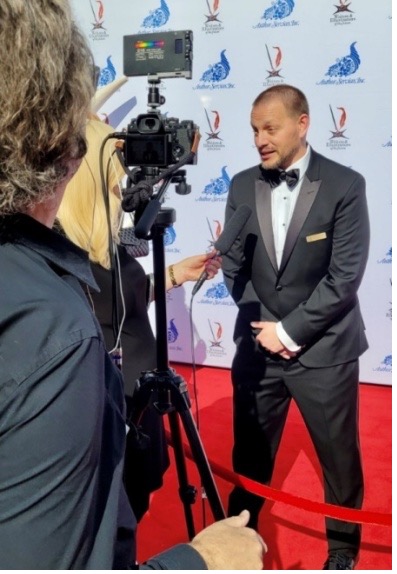
At the writer workshop, you’re given media training. It’s part of the weekly program. Some of it is trial by fire as cameras and mics are a constant companion.
Mind you, you’re not forced to conduct any interviews. It’s all volunteer if you’re game. Despite my nerves and introverted tendencies, I threw myself in. I’ve worked too hard to get to this stage not to grasp any given advantage.
These advantages have kept coming throughout this year. Winners have a PR and sales team in Hollywood that coordinates podcast interviews and book signings. After all, books need to be sold. Readers need to be found.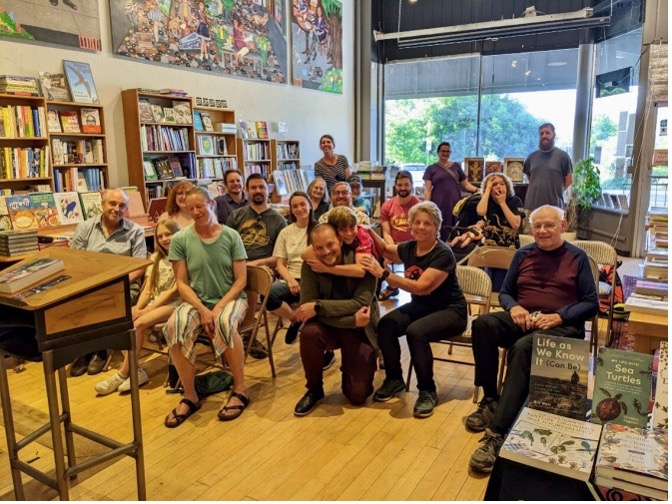
I’ve done readings and signings at my local bookstores. For each one, I was nervous beforehand and doubted whether anyone would show. They did!
On one occasion, I drove across Montana (my home state) for one signing at a bookstore. After which, I immediately drove on back. That was eleven hours of scenic driving in one very long day.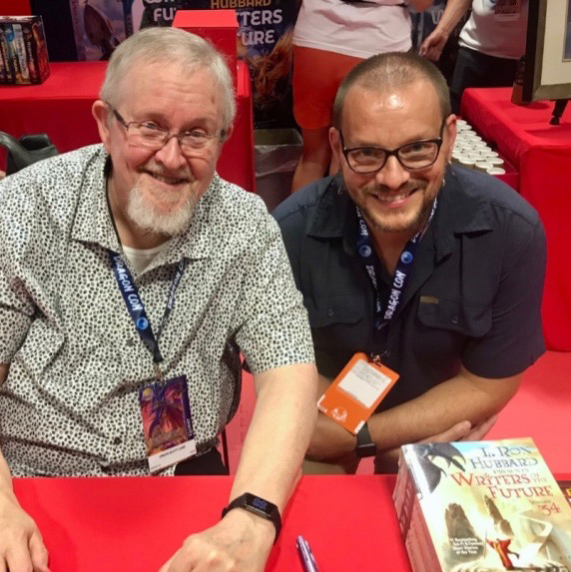
I’ve flown to Atlanta (my old stomping ground) to attend Dragon Con (such a fantastical circus!), where I had to swallow my imposter syndrome whenever I was on a panel. That lump in the throat was horse-sized when sitting next to Orson Scott Card.
Simply, I’m pleased to pound the proverbial pavement if it gets me any future readers. Why wouldn’t I? I have one shot at this career and life.
The Road Ahead
I wish I could write that I no longer feel that self-doubt. It still often pops up like a nasty game of whack-a-mole. Sometimes, it becomes stifling hot, and snags my breath, which leads me to the biggest lesson I’ve learned, one that continues to wallop me on the noggin like a dropped Acme-labeled anvil whenever I forget. And forget I do, and the bruised bump from the forgetting, while ever-swelling, is externally invisible. Yet felt just the same. More if I ruminate about it.
That lesson is that I must write no matter what. And not for any external validation. So not for any kind review. Or any trophy. Or any acceptance from a publisher. Or for any smiling reader who asks so kindly for my signature. Most emphatically—for me, most importantly—not for the perceived success in a growing bank account.
Do they motivate me? Yes. Will they sustain me? No. Because with the ups in this business, in this craft—hell, in life—come the many downs. And in art, especially if it confronts current worldviews (I posit the most indelible art does), there will be people who don’t care for it. And they will tell you so. Maybe not directly to your face, but in a review. Or in the form of a rejection letter. And that’s okay. Because once my art exists in the public sphere, it’s no longer for me. It’s for others to interpret however they will.
So, I must find a different reason to keep writing. I write because I hurt. Whatever its cause—which has curled me up on the bed before, which has gotten me to question my strength and my resolve and the whys on the why to keep on going—whatever its cause, writing gives me a way to process that pain and turn it into something I find beautiful. The I in the last sentence (in this world) is the important part.
That’s my reason. What’s yours?
Find it. Nurture it. Love it like a child. Because that reason, whatever it is, will be the fire that spits out stories that only you can and need to write. That authenticity will drip from every word and every sentence. It will coat your story through. That authenticity, your fire, will burn so brightly readers will see it, love it, and want to warm themselves by it. That’s how you find your readers. Or rather, they find you.
So I ask again. What’s your reason?
John Eric (“J.E.”) Schleicher is an award-winning author who writes stories that leave behind a fantastical aftertaste long after reading. His short fiction has appeared in various publications such as L. Ron Hubbard Presents Writers of the Future Volume 40, Creepy Podcast, and The Colored Lens Speculative Fiction Magazine.
His short story, “Squiddy,” was a winner of the Writers of the Future Contest and is currently being novelized. When not reading or writing, he enjoys wandering wonderstruck (on two legs or knobby wheels) the mountains near his home in Missoula, Montana.
Can’t get enough of J.E.? He’s got you. Discover his delights on his blog Dopamine’s Delight or connect with him on Threads & Instagram @JESchleicher.

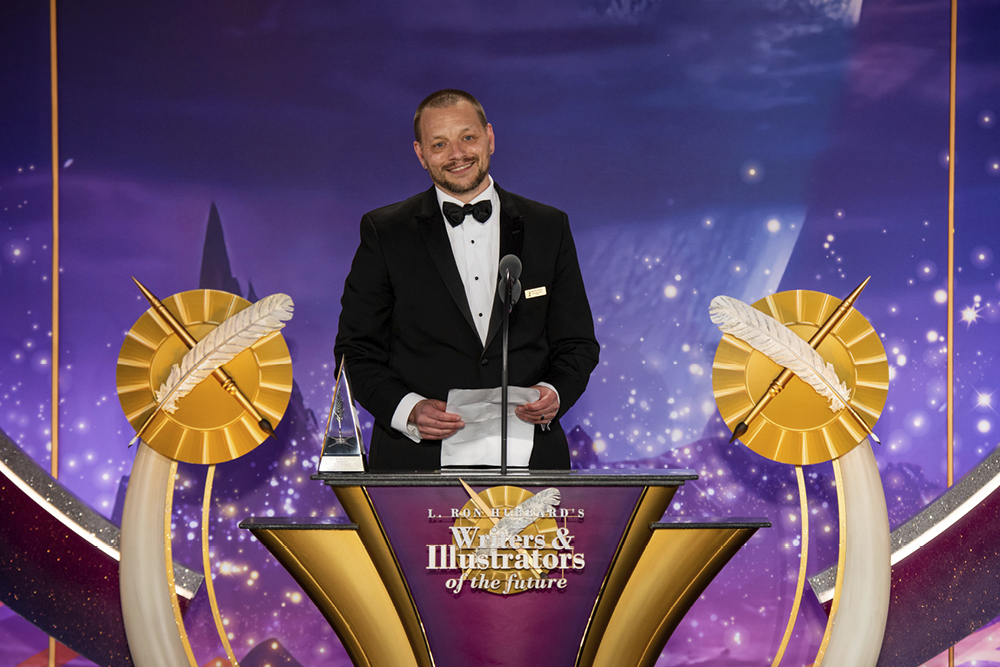
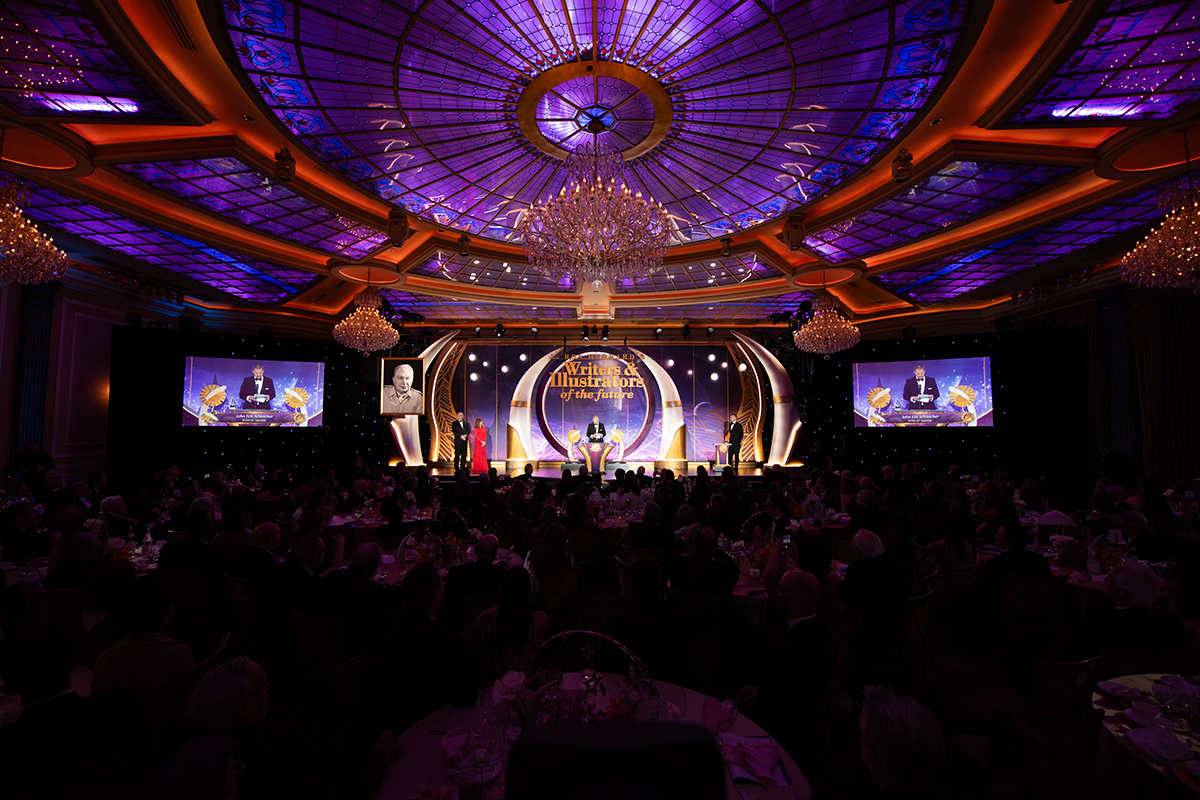



Leave a Reply
Want to join the discussion?Feel free to contribute!